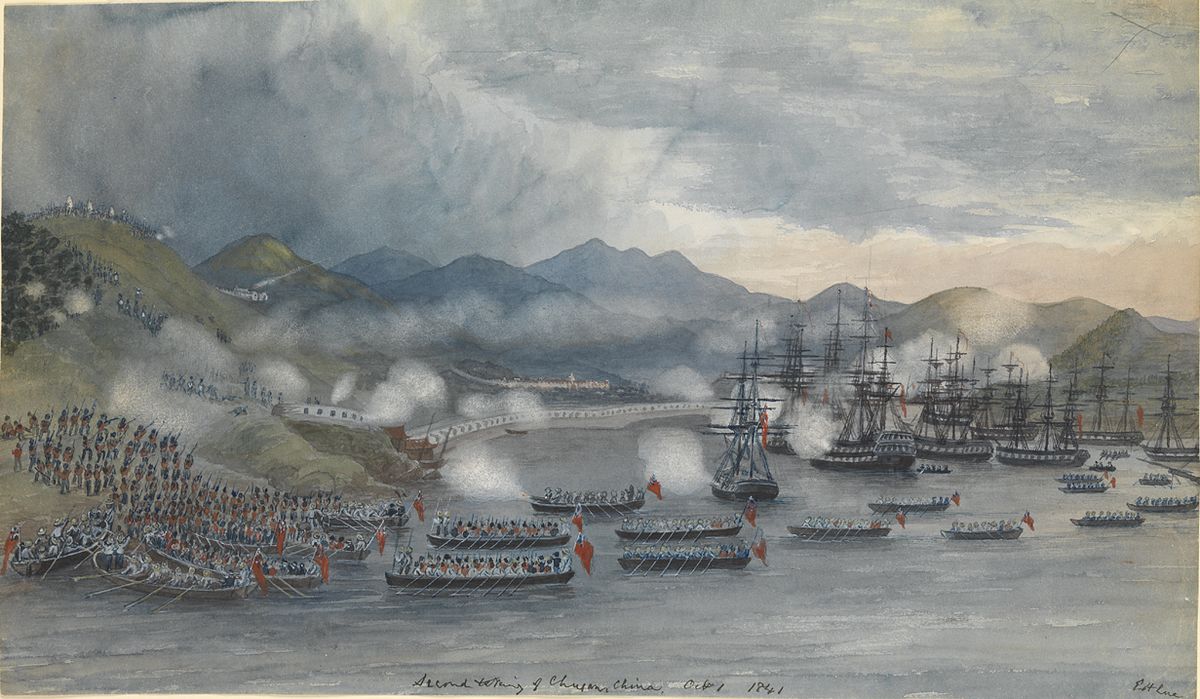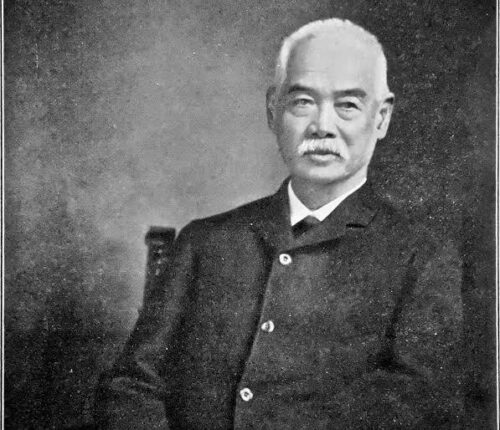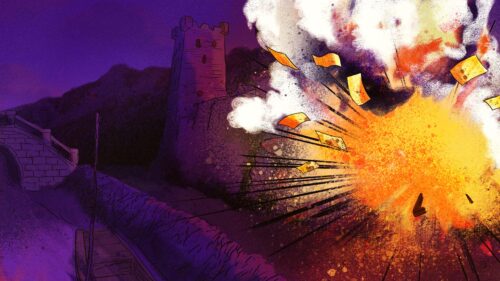This Week in China’s History: October 1, 1841
On the morning of September 30, 1841, 2,600 British soldiers and marines landed on the island of Zhoushan, just off the coast of Zhejiang province. Supported by barrages from the ships off shore, “the advance quickly ascended the hill,” according to one British observer, “and gallantly carried everything before them, although a more resolute stand was made by the Chinese than had been previously experienced in any encounter with them.” By 2 p.m. the next day, the Union flag flapped in the Chinese breeze.
The very idea seemed unthinkable: that Great Britain would occupy a piece of China’s territory, but that was what happened. Enabled by the Opium War and part of Britain’s quest to establish trade with the Qing empire on its own terms, British marines landed on a small island, not too far from one of China’s major ports and near the mouth of an important river, and pried it away from Qing control.
This Week in China’s History looks back to Britain’s other Opium War possession in China, not Hong Kong but the island of Zhoushan, occupied (for the second time) on October 1, 1841.
Unlike many states in Asia, China itself never became the colony of another nation. It was, however, a victim of imperialism. From the middle of the 19th century to the middle of the 20th, China endured what its leaders came to describe as “a century of humiliation.” During these hundred years, China found its territory, sovereignty, and international standing undermined, its status as a world power wrecked. The start of this era was the first Opium War, out of which emerged extraterritoriality — the ability for foreigners to live in China and yet be immune to Chinese laws — and colonies.
Hong Kong is typically pointed to as the first British colony in China. And while by many measures it was, that dubious distinction needs to be at least shared with Zhoushan. And though Hong Kong has gone on to be synonymous with the British Empire in Asia, while Zhoushan is all but forgotten, many British officials at the time felt that their negotiators had blundered by choosing Hong Kong, rather than Zhoushan, as the center of their imperial enterprise in China.
When the British and Qing empires went to war in 1839, the center of the conflict was the area around Canton, i.e., modern-day Guangdong. That was where overseas European trade was based, where Qing official Lín Zéxú 林则徐 had confiscated and destroyed the illegal narcotic, and where British merchants had sought their government’s intervention to secure their freedom and also their commercial interests. Hong Kong, an island not far from Canton, had become a British base of operations in the weeks leading up to the conflict, and its use for controlling, or at least supervising, trade into and out of Canton and the Pearl River quickly became apparent.
But the Pearl River Delta was not the only theater of war. Soon after fighting broke out, Britain sought to blockade Chinese ports, including Ningbo, in Zhejiang. As part of the blockade, the British would occupy the island of Zhoushan, about 10 miles off the coast. After a naval battle involving some 40 vessels, British marines landed and captured the island’s capital, Dinghai, and established a base on the island.
As historian Christopher Munn put its, Zhoushan was “to serve as the base for the blockade of Ningbo and other vulnerable cities and as hostage for the diplomatic efforts of the British plenipotentiaries,” and it seemed to do the trick. By January 1841, Qing officials had agreed to cede Hong Kong, reopen trade at Canton, and pay an indemnity to recover Zhoushan. Captain Charles Eliot complied with the agreement and surrendered the island.
But the apparent agreement quickly collapsed. Qing authorities reconsidered their position and charged their own negotiator, the Manchu Qishan, with treason for giving Qing territory to its enemies. For their part, the British were just as frustrated with the deal. In no small part, this had to do with Zhoushan: why, the British leadership asked, had they surrendered Zhoushan and retained Hong Kong, rather than the other way around?
Numerous reasons recommended Zhoushan over its (now) more famous counterpart to the south. For one thing, Zhoushan is centrally located, on the center of the Chinese coast and near the mouth of its largest river. This more northerly location meant that its climate was much more moderate than tropical Hong Kong, though Zhoushan also suffered from outbreaks of malaria and other disease. Finally, although Hong Kong was not the “barren rock” that British officials sometimes claimed, it was far smaller than Dinghai, the largest city of Zhoushan, which housed nearly 30,000 people in the 1840s. Zhoushan island itself was some 200 square miles in area, nearly seven times larger than Hong Kong, with easier access to Ningbo and the cities of the Yangtze Delta: Hangzhou, Suzhou, Shanghai, Nanjing, and others.
With both sides renouncing the peace, war resumed. British warships returned to the Yangtze Delta and set their sights back to the island they had just relinquished. In the amphibious assault described at the start of this column, British forces overwhelmed the Chinese defenders and reoccupied Zhoushan.
And stayed there for some time. The peace treaty that was finally settled in August 1842 in Nanjing confirmed the cession of Hong Kong as a British colony, along with the opening of five treaty ports, a larger indemnity, and extraterritorial rights. As leverage, the British would occupy Zhoushan until all of the indemnity had been paid.
During this five-year occupation, a movement emerged to change the terms of the treaty and make Zhoushan, not Hong Kong, a British colony. In his article, “The Chusan Episode: Britain’s Occupation of a Chinese Island, 1840-46,” historian Munn describes a rapidly growing movement that “saw in [Zhoushan] and its people all the qualities that the British needed in a Chinese colony and proposed exchanging it for Hong Kong…. Chusan’s rolling hills and healthy breezes could hardly have provided a more striking contrast to the stark peaks and subtropical insalubrity of Hong Kong…. ‘Chusan in the spring’, wrote the imperial botanist Robert Fortune on his arrival there in April 1844, ‘is one of the most beautiful islands in the world. It reminds the Englishman of his own native land.’”
The desire to overturn the treaty gained such momentum that even once the terms of the indemnity had been met, British diplomats refused to leave. One British official in Hong Kong, Robert Montgomery Martin, was overwhelmed by the piracy, disease, corruption, isolation and other troubles facing the crown colony. “The solution Martin proposed to all these problems was simple,” Munn writes, “abandon Hong Kong, retreat from all the treaty ports except Canton, and retain Chusan as a free port.” Even the British Foreign Secretary authorized his representative to negotiate the permanent cession of Zhoushan as a colony.
The fate of Zhoushan became tied to another unresolved dispute from the war: residency in Canton. Although the British believed it was negotiated in the treaty, Qing officials refused to allow foreign residents full access to Canton city. British negotiators traded acknowledgment of that right for British evacuation from Zhoushan, which finally took place in June and July 1846. Perhaps underscoring the point for those who felt leaving Zhoushan was a mistake, the concession did little good, and disputes over residence in Canton would eventually contribute to the Second Opium War, in 1858.
The history of Hong Kong has become so central to China’s relations with not only Britain but the West, it is worth remembering that like everything else in history, its fate depended on a series of decisions — made and not made — and their unintended consequences. One wonders, if things had gone just a little differently, would Zhoushan now be the focus of “one country, two systems,” and a controversial retrocession?
This Week in China’s History is a weekly column.






